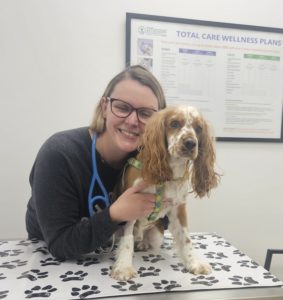Many dogs and puppies that are brought home from shelters and pet stores and even boarding facilities today can develop a cough, often referred to as “kennel cough”. As a dog owner it is important for you to be aware of the facts of this disease process.
What is Kennel Cough?:
This is also known as Canine Infectious Respiratory Disease Complex, and is a highly contagious, often multifactorial condition (hence the “complex” portion of the name). There are many possible causes for puppies and dogs to start coughing, including several types of viruses (distemper virus, parainfluenza, adenovirus, pneumovirus, canine influenza virus, etc) that are easily spread through the air, in shared food and water bowls, and even present on bedding or clothing. In addition to viruses, there are several bacterial causes that may also be present (Bordetella, Mycoplasma, and Streptococcus zooepidemicus) which may contribute to the disease. Any one of these alone has the potential to cause coughing, but it is most common to have several factors combined together to result in a coughing dog.
Course & Signs of Disease:
Depending on the causative agents, the typical incubation period is often 2-3 days before clinical signs are noted, and these dogs are often shedding those pathogens before we see the clinical signs. Depending on the causative agent, they may shed the disease for at least 5-10 days, or potentially for weeks. The cough itself may only last for a few days, but some can last several weeks. Most are what is called “self limiting” and clear over time, but there are some instances that can progress to pneumonia. Signs can include cough (typically worsens with excitement), some may have clear to discolored nasal or ocular discharge, and if the disease progresses we may see a decreased appetite, lethargy or depression, and even difficulty or labored breathing.
Diagnosis:
Often your veterinarian will have a strong suspicion for kennel cough based on clinical signs and history alone. Fortunately there are many new tests available to try to determine a possible cause. These tests are relatively easy to perform, but can take several days for the results to return. This may be recommended by your veterinarian if there is a prolonged cough, or if there is a suspected outbreak in your area.
Treatment:
Treatment is often symptomatic and supportive. No single “drug of choice” is appropriate given the potential for several causative agents. Commonly antibiotics will be prescribed for the bacterial component, but the viral components will often have to “run their course”. Keeping your pet well hydrated and nourished is important. The immune system is compromised during times of illness and could weaken the pet further, so careful monitoring of attitude and appetite is important. Most veterinarians will consider that pet “contagious” for a couple of weeks or potentially up to a month depending on the causative agent present, and isolating him or her from other dogs to prevent further spread of disease is recommended.
Prevention:
There are vaccines available for many of the potential causes for kennel cough and canine influenza and a proper vaccine schedule should be followed for all puppies, and all adult dogs that may be exposed to other dogs. Decreasing exposure to other dogs until all vaccine boosters have been administered may help to reduce the risk of contracting this disease. Good overall health and nutrition of your pet are also very important for good immune health.
Who is Most at Risk?:
Dogs and puppies in heavily populated situations such as shelters, pet stores, boarding facilities as well as day care settings are exposed to much higher numbers of possible carriers of disease than the average “apartment dog” with minimal exposure to other dogs. They also may be under additional “stress” which can increase the risks of contracting diseases they would normally not have a problem facing. It is important to keep in mind, that even on a walk, your dog may be exposed to a potential virus or bacteria left by another dog that was recently on the same path and develop symptoms.
What Should I Do if My Puppy or Dog is Coughing?:
If your puppy or dog develops a cough, it is important to have your veterinarian evaluate your pet. He or she can then help determine what the best course of action should be for that individual patient and can provide follow up monitoring.







